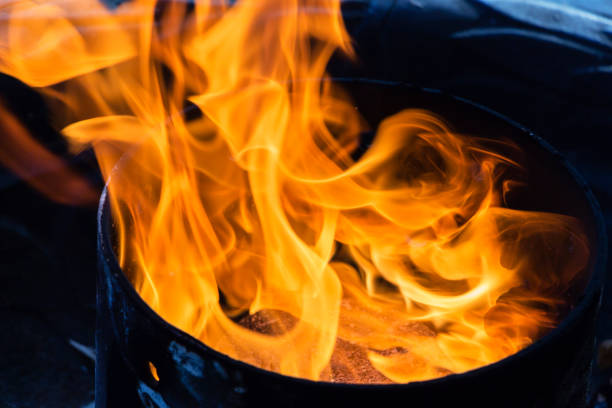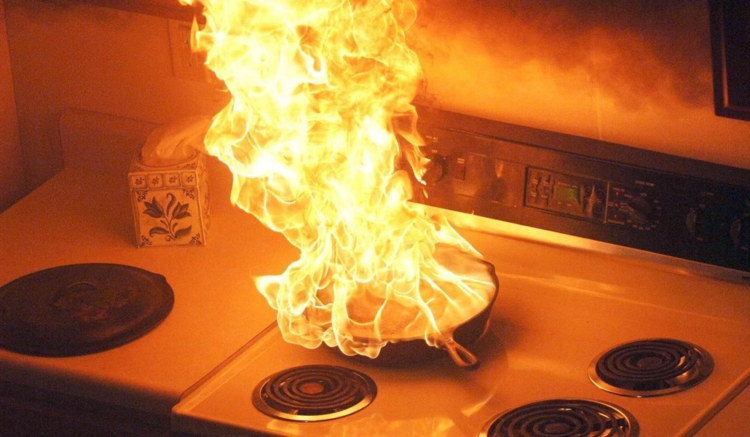Grease fires can occur suddenly and be extremely dangerous. Knowing how to safely extinguish a grease fire can save lives and prevent severe damage. This article will explain the necessary steps to put out a grease fire effectively and the safety precautions everyone should follow.
Immediate Steps to Take
If a grease fire starts, it’s crucial to act quickly and correctly. Here’s what you should do immediately:
- Turn off the Heat Source: The first thing you should do is to turn off the stove or heat source. This will prevent the fire from growing larger.
- Cover the Flames with a Metal Lid: If possible, cover the flames with a metal lid or a baking sheet. This will cut off the oxygen supply, suffocating the fire.
- Use Baking Soda or Salt: Liberally sprinkle baking soda or salt over the flames, which can help smother the fire. However, never use water, flour, or sugar as they can worsen the situation.
Tools to Keep on Hand
Being prepared can make all the difference when dealing with a grease fire. Here are some tools to keep in your kitchen:
- Fire Extinguisher: Specifically, an ABC-class fire extinguisher can handle various types of fires, including grease fires. Make sure it’s easily accessible.
- Metal Lids and Baking Sheets: Having these items nearby can help you quickly cover a burning pan.
- Baking Soda: Keep a box of baking soda readily available in your kitchen. It’s an excellent tool for smothering small fires.
What Not to Do
Knowing what not to do during a grease fire is just as important as knowing what to do. Here are common mistakes to avoid:
- Do Not Use Water: Water can cause oil to splatter and spread the fire, making the situation worse.
- Do Not Attempt to Move the Pan: Moving the pan can cause hot oil to spill, potentially spreading the fire or causing burns.
- Do Not Use Fabric Items: Never use towels, fabric oven mitts, or any paper products to extinguish the fire, as they can easily catch fire themselves.
When to Call for Help
While minor grease fires can often be handled with household items, there are times when professional help is necessary:
- Fire is Out of Control: If the fire spreads beyond the pan or starts to grow rapidly, evacuate immediately and call 911.
- Injury Occurs: If anyone is injured, seek medical attention right away, even if you’ve managed to put the fire out.
- Structure is Engulfed: If the fire begins to engulf cabinets or other kitchen structures, evacuate and call for emergency services.

Preventing Future Grease Fires
Taking preventative measures can significantly reduce the risk of grease fires in your kitchen. Here are some tips:
- Stay Attentive: Never leave cooking food unattended, especially when frying with oil.
- Use Cooking Thermometers: Monitor oil temperatures to avoid overheating, which can lead to ignition.
- Keep Flammable Materials Away: Ensure that items like paper towels, wooden utensils, and fabric towels are kept clear of the stove.
Conclusion
Grease fires are a serious hazard, but knowing how to handle them can protect you and your home. Immediate actions include turning off the heat, covering the flames, and using baking soda or salt. Being prepared with fire extinguishers and understanding what not to do are equally crucial. Remember, if a fire becomes uncontrollable, evacuate and call emergency services. By staying attentive and taking preventative measures, you can avoid grease fires and ensure your kitchen remains a safe environment.
FAQs
1. Can I use flour to put out a grease fire?
No, using flour can actually make a grease fire worse. Flour is highly flammable and can cause the fire to spread.
2. Why shouldn’t I use water to extinguish a grease fire?
Water causes grease to splatter and can spread the fire, making the situation more dangerous. It can also cause a violent steam explosion.
3. Can a fire blanket be used to put out a grease fire?
Yes, a fire blanket can be very effective in suffocating the flames by cutting off the oxygen supply. Make sure to cover the entire surface of the fire.
4. How do I know which type of fire extinguisher to use?
An ABC-class fire extinguisher is suitable for grease fires. Check the label on the extinguisher to make sure it’s rated for use on oil and grease fires.
5. Should I open windows to vent out smoke during a grease fire?
It’s generally better to keep windows closed to avoid drafts that can fan the flames. Focus on extinguishing the fire and evacuating if necessary.
